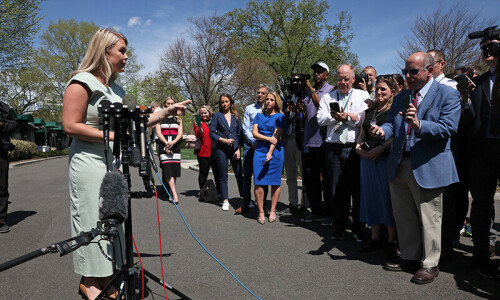KARACHI: Experts on Tuesday said at least half a million people in the country died annually due to medication “errors”.
Wrong prescriptions, overdose of medicines, and adverse side effects of drugs topped such errors that took human lives.
“As many as 500,000 people, including women and children annually die in Pakistan due to medication errors, which include wrong prescription, overdose of drugs, self-medication and adverse effects of medicines,” said Abdul Latif Shaikh, president of the Pakistan Society of Health System Pharmacists (PSHP), at a press conference at the Karachi Press Club.
“These lives can be saved by adopting international practices vis-à-vis drug safety,” said Mr Shaikh, a senior pharmacist.
He said around 80,000 people annually died in the United States alone due to medication errors.
However, he said such data was not officially available in Pakistan due to lack of required mechanism.
“We don’t have actual data but we estimate that annually 400,000 to 500,000 people die in Pakistan as well owing to wrong administration of drugs, and other lethal errors in medication.
“This is a highly alarming situation meriting immediate attention of authorities and pharmacists.”
The PSHP chief said his organisation would hold its second international conference titled ‘Quality, safety and outcome; a paradigm shift in pharmacy’ on Saturday in the city.
It would be aimed at remedying the increasing issue of medication errors in Pakistani hospitals, ensuring administering safe drugs to patients, providing quality medicines to people and other related issues.
“Two of the world’s distinguished experts, Prof Henri R. Manasse Jr from the University of Illinois Chicago and Jacqueline Surugue from France would be arriving in Karachi for the first time to speak about international practices in the field of pharmacy and how the situation in Pakistan can be improved by adopting international practices,” said Mr Shaikh.
He lamented that pharmacists were not being given their due role in the healthcare system in Pakistan and despite their induction in hospitals, they were not being consulted in prescription of drugs, dosage and other issues, which often created serious problems.
However, he was happy to see the importance of pharmacists had lately been felt in Sindh.
“Sindh has recently inducted hundreds of pharmacists in its hospitals and we hope they would be allowed to use their knowledge and skill in dealing with issues of medication and administration of safe and quality drugs to patients,” he said.
He added that there was no system of reporting of adverse effects of drugs in the country’s existing healthcare system and neither the patient, nor doctors were reporting such negative effects of drugs to the relevant authorities.
‘Problematic drugs’
“Due to all this, problematic drugs continue to cause problems for general public.”
He said the conference would cover all those issues, which would create awareness among people of safe administration of drugs and reporting such issues to the authorities concerned in case of some harmful reaction to save others from enduring similar complications.
Chief of the Central Drug Testing Laboratory Dr Saif-ur-Rehman Khattak said the Drug Regulatory Authority of Pakistan had increased the number of federal inspectors of drugs in Karachi.
He said raids were being conducted regularly to seize spurious and counterfeit drugs. Besides, he added, other required measures were being taken to prevent people from consuming spurious drugs.
Chief pharmacist of the National Institute of Cardiovascular Diseases (NICVD) Jibran Bin Yousuf said drastic measures were being taken at the NICVD to improve the administration of drugs. To augment the same cause, he added, modern digital systems were being acquired.
Published in Dawn, October 11th, 2017














































